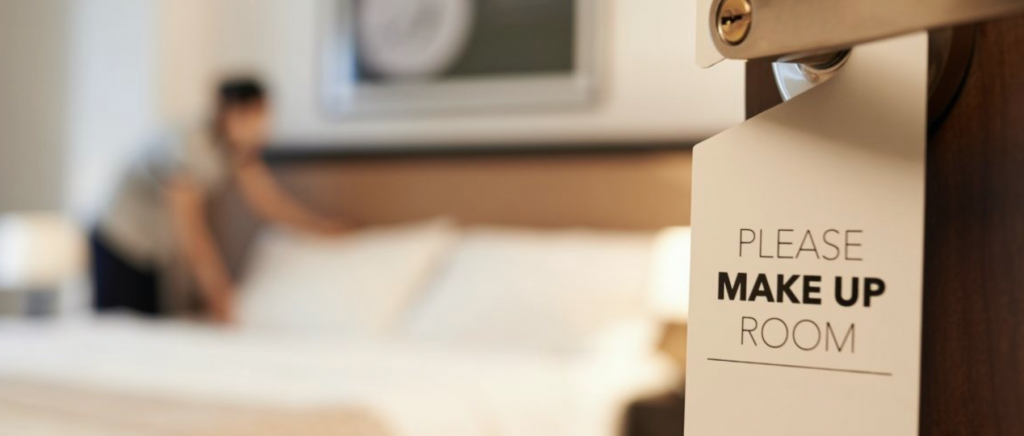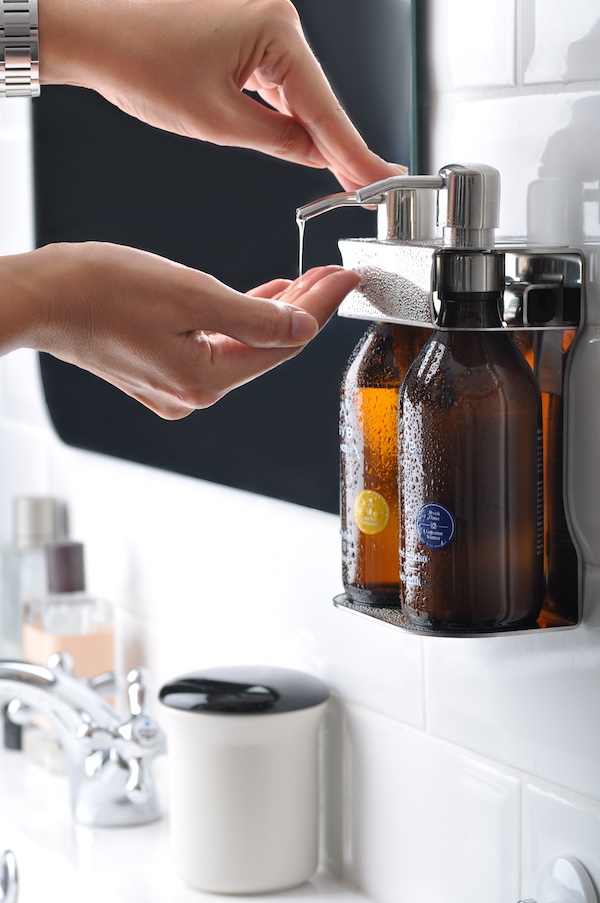
Why is now the best time to reduce single use plastic?
The author of this article is Jo Hendrickx, the creator of Travel Without Plastic. You can find its’ original version here. For more information or support in transitioning away from miniature amenities, please contact Travel Without Plastic on info@travelwithoutplastic.com or download their FREE introduction to reducing miniatures here
Previously unthinkable strategies are becoming a reality as people, businesses and governments use this time to implement new and more sustainable policies as part of recovery plans.
At a time when some hospitality businesses are considering temporarily reverting to single-use plastic for health and hygiene reasons, we look at some of the opportunities to do the exact opposite, and even go so far as to suggest bold new brand standards that would see some single-use products forever eliminated from hotel rooms.
One of the biggest volumes of single-use waste in hotels comes from amenity kits. Statistics vary, but consumption figures from hotels we have worked with show that they are second only to bottled water in terms of waste generation.
It’s not unusual to find 15-20 miniature amenities in one room. We often question why a hotel considers 2 earbuds, 2 cotton rounds and an individual paper tissue all wrapped in plastic to be either necessary or even desirable. Not to mention a shoe-shine in a hotel were everyone wears flip flops, a shower cap that rarely fulfills its function and a comb with teeth so small that it would actually be painful to use.
Instead of adding to the guest experience, they are now adding to the list of items that housekeeping teams will need to clean and sanitise. As guests check out and unopened miniature amenities are left behind, will housekeeping really have the time or the inclination to sanitise them all ready for the next guest (bearing in mind they need to wait for dwell times to be reached to ensure sanitation) or is it more likely they will be discarded and replaced with new ones, creating waste and wasting money?
This is the ideal time to revisit brand standards and to consider removing some – or dare we suggest even all miniature toiletries – plastic or not – with the exception of hand-washing soap or gel. There are many benefits to having less amenities in guest rooms:
-Fewer items to harbour germs
-Easier to keep the room clean and sanitised
-Less time-consuming for housekeeping staff
-Significantly reduces waste
-Reduces associated costs
To make the transition as smooth as possible, customers will need to be informed of WHY you are making the change and what alternative course of action they should take. For example, will you make amenities available on request, will you provide full size amenities for sale in the hotel, will you be switching to refillable alternatives for key products such as shampoo and shower gel?

Take some time to think about all the platforms and media you can use to reach guests before and during their stay. Maybe it’s information on an email confirmation, posts on social media, a newsletter or a pop up on the website that encourages guests to travel with their own toiletries. Perhaps a polite notice in guest rooms to inform them that amenities are available on request / for sale, or a notice that gives them confidence that refillable amenities are cleaned and sanitised daily – see our tips on this below.
Some hotels we have worked with have already seen significant waste reductions by following these suggestions even before there were concerns around hygiene. Others have been reticent and concerned that having provided this service for so long, customers would complain, but they never tested this hypothesis and just carried on with the habit.
The tourism industry created expectations around amenities in the first place, we now have the opportunity to establish a new normal that champions the ‘less is more’ approach. In our opinion, this is absolutely the best time to trial this change as guests are likely to feel more comfortable travelling with their own products.
Now more than ever it appears likely that there will be more acceptance – or certainly less resistance when it comes to breaking old habits.
The Future of Refillable Amenities
Taking all of the above into consideration, we are of course realistic and understand that many hotels will want to continue providing amenity products for their guests, or may even be obliged to do so by local authority standards.
We asked the creators of luxury amenity brand live+421 to tell us how they work with their hotel clients to help inform the creation of Standard Operating Procedures to ensure optimal hygiene standards when using their refillable products.
Live+421 provides sustainable solutions for Hotel and Spas. One of their main objectives is to prove to their hospitality clients that sustainability can be luxurious, and that refillables can be hygienic and safe.
Their amenities dispenser system is made of high quality stainless steel, uses refillable glass bottles and establishes operational refilling protocols with each contract. When hoteliers evaluate the best option for in-room and common areas amenities, refillable systems are a great way to fight the plastic pollution that originates from the hospitality sector, whilst at the same time providing hygienic solutions when proper procedures are agreed and put in place.

‘Clients who work with Live+421 are supported throughout the procurement process. The company philosophy is to build a relationship with our clients and to add value to our proposition by developing SOPs and training housekeeping staff on the correct refill procedures. Once amenity dispensers are fitted, refills are ordered in bulk and we collect back the empty refills so that they can be suitably sanitised and reused, helping hotels to implement more circular processes.
It implies an initial investment and an on-going commitment from the hotel, however it creates a unique solution for guests and has a positive impact on the environment’ says Victor Pellicer of Slovvellness.
The guest experience of the future will have a focus on safety and this is likely to play a critical role when choosing travel destinations and where to stay. Communicating improvements about sustainability and hygiene protocols will be key for hotels in order to attract back guests.
What are the key considerations when choosing refillable options?
Victor’s recommendations to any hotels who are keen to continue providing amenities safely to their guests and without creating waste are:
-Look for quality refillable systems that are easy to keep clean and disinfected.
-Ensure refilling protocols are being conducted outside of the bathrooms by staff wearing gloves and masks, in order to minimize any risk.
-Choose designs that ensure amenities bottles are protected against client tampering
-Disinfect bottles, pumps and brackets after each stay.
-Choose refillable bottles that are dishwasher safe, this means that they can be regularly removed and disinfected by going through a full dishwasher cycle.
-Communicate your procedures to guests, let them know that not only are you implementing a safe and hygienic service that, but that it is also a more environmentally friendly choice.
‘We concluded that many things have changed during these past months, but we need to keep in mind that plastic waste reduction is our main objective. We have an opportunity to find new options that support this goal while enhancing hygienic measures to provide safety for our hotel clients.’
For information on the live +421 systems, please visit www.live421.com or email info@live421.sk


No Comments